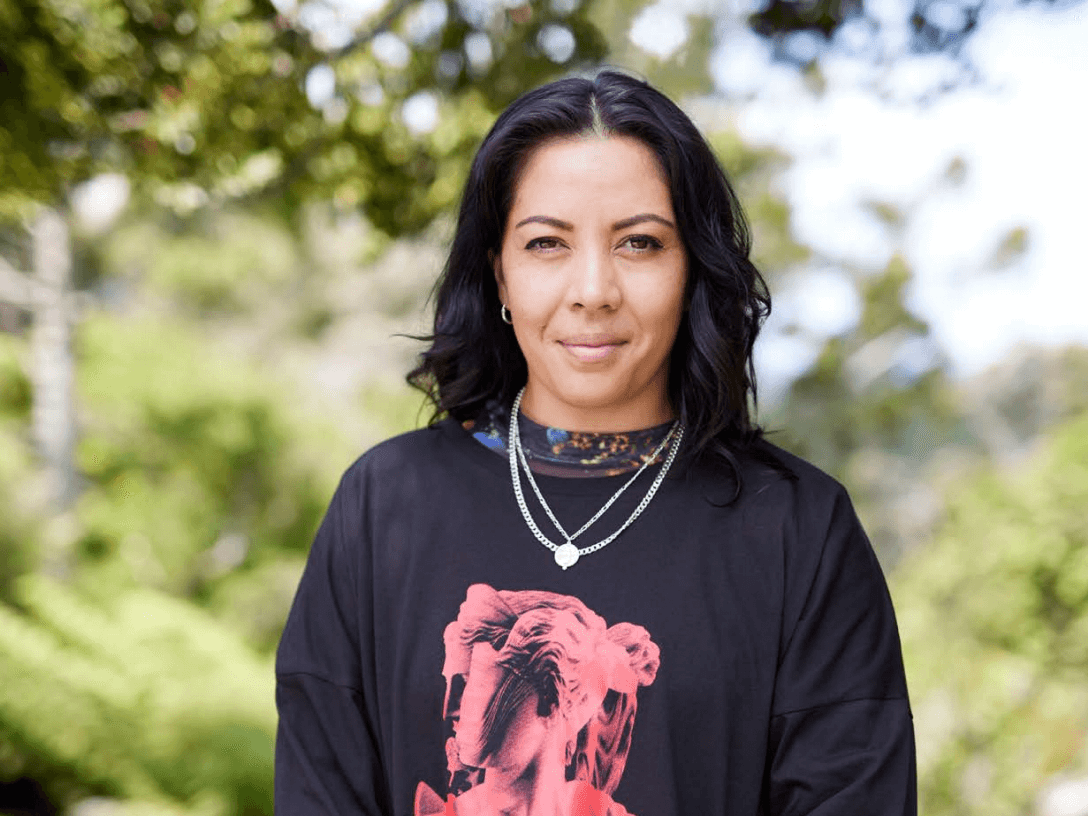May 4, 2021 Theatre
It’s no coincidence that beside the Mayoral Drive bridge, surrounded by its buttoned-up big siblings, Basement Theatre sits below street level. Here, a quiet revolution is under way with the recent crowning of Cat Ruka (Ngāpuhi, Waitaha) as its executive director — the first wāhine Māori to take the helm.
Basement Theatre, now in its 13th year, has always been the outlier in the theatre scene: a safe space for first-timers to test out the waters; the provocateur rallying against convention. And “groundbreaking” has indeed been the response in theatre circles to Ruka’s appointment, and the Auckland-based artist agrees that “handing the keys of a long-standing arts organisation over to tangata whenua” was no small action.
Ruka is quietly confident she knows how to lead through uncomfortable pieces of mahi from a place of love and nourishment, and in a way that uplifts rather than undermines the mana of everyone in the room. “We know how to do this because we have thousands of years worth of ancestral knowledge around how to hold space for difference. Our tūpuna taught us how to incite the mana of everyone, and not just those who look like us and think like us. In fact, manaaki [hospitality] is the very act of putting the manuhiri’s needs before your own, because we come into our own mana through serving the mana of others.”
It’s been a steep climb for Ruka from humble beginnings in the 1990s, criss-crossing between mother Vida’s Warkworth home and father Raureti’s marae in the Hokianga. An award-winning choreographer, she’s toured performances nationally and internationally, so her proud whānau weren’t overly surprised about her latest milestone.
Along the way, the polymath discovered an appetite for research, gaining a bachelor’s degree, a post-graduate diploma and a master’s degree through the University of Auckland’s dance studies programme; a PhD is currently on hold. “My brother Nuku always jokes I’ve pretty much had a clipboard in my hands since primary school, so the Basement role is really just the next step in clipboard life, I guess.”
Basement’s recruiting drive was certainly far from run-of-the-mill. The board outsourced the search for a new executive director to a group of industry specialists — including Rosabel Tan, Graham Tipene, Toluma’anave Barbara Makuati-Afitu and Kolokesa Uafā Māhina-Tuai — to discuss extensively within its own immediate and wider community, who in turn were asked to reimagine the process of selecting the incoming leader.
Canvassing such a large and diverse group could easily have gone the way of most well-meaning projects — an endless schedule of meetings running indefinitely and arriving at the lowest common denominator of consensus. But, true to form, the Basement community showed depth among its collective genius, producing a unique creative approach that, after talking with Ruka, has since formed the genesis of a new kaupapa and a new chapter in the life of the theatre.
Like everyone who threw their hats into the ring, she was asked to present a 10-year vision to both the Basement’s staff and its supporters, fronting up to people from right across the theatre’s community — be they backstage workers, on-stage performers or members of the ticket-buying public. Ruka wasn’t fazed. She says knowing that all of the Basement sta and members of the wider community were reading her application and critiquing it was a liberating experience.
“To know that the people who would be directly impacted … were having a say in the process gave me hope in where things are going in the arts.”
The lead-up involved Ruka amassing a strong backline of some 20 key players from the arts, education and social sectors supporting her through those early stages; four of those stalwarts accompanied her to the final interview. One of their objectives was questioning the board; how would it potentially support the first wāhine Māori to take the lead? Then she flipped the interview process on its head, producing a truly breath-taking moment (which most likely clinched the role): she made a case for why she shouldn’t outline a 10-year vision.
“Don’t get me wrong,” she says. “I’m brimming with ideas, I certainly have a vision and an awareness for what needs to shift — but so does everyone else.” Instead, Ruka drove home the importance of listening. “What I learnt from one of my mentors very early on is it doesn’t matter who you are — anyone who steps into a position of power within a new community has the potential to colonise and undermine the knowledge base that already exists there.”
Ruka articulated a desire to listen to and observe the existing knowledge from the operations and governance teams, bringing both academic rigour and a willingness to “weave that knowledge into a shared collective kaupapa for Basement to leap off from”. Although it’s very early days, she says, “allowing tangata whenua to lead in these spaces also means unlearning generational habits, going into the absolute unknown. It means being okay with making mistakes, and it often means doing more listening than talking.”
I ask about key arts organisations being required by Creative New Zealand (a major funder and “core partner” of Basement Theatre) to demonstrate how they will deliver to New Zealand’s diverse communities. “When words like ‘diversity’ started to pop up in funding strategies and, in turn, in the policies and strategies of our arts organisations, there was no blueprint for how to do this safely, nor any warning signs of how damaging diversity KPIs [key performance indicators] could be,” she says.
“What Pākehā-led arts organisations have been doing for a long time now is what I call ‘decorational’ or ‘performative’ diversity. Essentially, what that involves is decorating the public face of an organisation with People of Colour activity, whilst still maintaining a very colonial core and way of leading and operating.”
Ruka introduces the chocolate-chip model to elaborate. “My friend Gab, a Pākehā, recently said that for too long, we’ve been sprinkling incredibly delicious chocolate chips on top of cookie batter to make them taste and appear interesting, but at the end of the day, the cookie is still mostly made up of white batter. There’s no denying that that batter drives the overall shape and existence of the cookie.”
The former Tempo Dance Festival director has long stressed the importance of creating space for wider representation. “The conscious programmer or venue is aware of the power it holds in being the distributor of opportunities, and understands that for every programming choice they make, they are also choosing to not programme a whole bunch of other work.” By taking a more agnostic approach, Ruka wants to redress this inequity. “I’ve told myself to get off my butt, out of the swivel chair, away from the emails, and go meet some artists you don’t know.”
She understands that some artists, especially those of Te Moana Nui a Kiwa (people of the Pacific), will need deep relational trust first to allow indigenous theatre to step into the space. “What we’re actually doing is opening up important space for communities to come together and be transformed.”
With the hurdles of 2020 now almost at a safe distance (fingers crossed), Ruka is impassioned about doing everything possible to stage sell-out shows: “In doing so, you lift the mauri [life force] of that artist-audience exchange to its maximum vibration. An empty seat is a missed opportunity for someone to partake in community alchemy. We sell out shows to whakamana [empower] the moment first and foremost; meeting the budget targets is a great consequence of that.”
With such an abundance of energy for the arts, Ruka manages to take a step back whenever she’s among her whānau, and she credits them for keeping her feet firmly on the ground. “My family’s response [to her Basement appointment] was super chill. It went down as just another unsurprising piece of info as ‘Cat does intense stuff at mahi’,” she laughs. “I know my family are super proud of how hard I work but … they are way more interested in the actions I take as a mother, a sister, an aunty. Honestly, we keep it pretty pared back and simple in our whānau; we try to stay humble, to [focus on] what really matters, which is who we are in the whare when no one’s watching.”
Meanwhile, she and partner Glen are enjoying watching seven-year-old daughter Lucci follow in her mother’s footsteps, having caught the dance bug and developed an eye for fashion and a love for te reo Māori. It is Ruka’s father, Raureti, though, whom she credits as being her greatest influence. “He absolutely shaped me to be who I am. Our relationship was a portal to the cosmic potential of indigenous creativity and excellence.”






